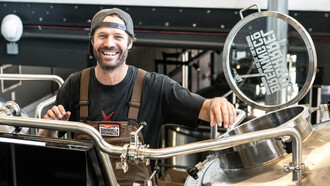‘I live near Greve in Chianti, the heart of Tuscany and probably one of the most conservative places in terms of food and wine traditions’, says Marco, while we walk on the green slope by his farm to reach for the goat retreat.’
This area is famous for the production of Pecorino cheese (made with sheep milk) or for the Florentine steak, but not for goats! So the people used to call me the ‘goat man’, when they saw me walking around town... Even my father in law, one of the best known family doctors in town was a bit scared when the gossip ‘the goat man is dating with your beloved daughter’ reached him. He laughs heavily though he admits it was not an easy period for him… He had a very smart profession as lighting technician in the acting studios and theatres around Europe, so he was used to travelling a lot and to having a very busy routine. Somehow he dreamt of a quiet life in close touch with nature and slow passing of time. A bucolic life, where you forget about agendas, mobiles, flights, in turn of dairy, milking, barns… and a band of goats in need of care and affection. That is how Marco became an artisanal goat cheese maker in Tuscany. ‘However, every coin has a back side and, even if life in the countryside is charming and beautiful, it implies heavy extra efforts to make the business work and not much time is left to relax and rest’.
Eventually the family grew in kids and flocks and Marco became part of the local neighborhood. I have met him in a rainy day in October, when the production of cheese is close to an end as goats are not feeding kids and milking runs low. That is the time for cheese to rest and age in cellars during the winter months, concentrating all the flavours in the paste and covering up in a white and soft molded crust. Nonetheless, we had the chance to put hands on the cheese-making process with some soft caprino and to taste all the repertoire of products from the mildest to the strongest goaty one. When the rain stopped, we walked uphill to visit the goat barn, accompanied by the all Marco’s family pets, our guides.
‘We have 100 "Chamois girls" and two happy males’, Marco says ,’ Cheese production begins in mid-March and ends in late October. In March, after having only their mother’s milk for the first 40 days of their lives, the baby goats begin to eat grass and hay, then we can slowly start with regular milking. By October, however, many goats are pregnant again and this is the time when the activity rests and we strive a bit to cope with all our dues.’
In the last years, in fact, Marco has put forward a brand new project ‘Adopt a goat’, which is based on a small annual contribution, helping the farm to support itself during the ‘milkless’ months of the year, i.e. no income. The smartest part of it is that your contribution will be returned in equivalent amount of milk, cheese, and meat to be picked up at the farm, at markets or to be shipped to you. It is a great idea to eat high quality, healthy artisanal cheese from Tuscany, while supporting Marco’s endevours!
What stroke me most of my visit at Podere le Fornaci was the opportunity to meet Marco and learn about his story, made of hard passionate work, struggles, contingencies in order to pursue a dream: to be what you are and not what the society drives you to become. To be a goat man in the land of pecorino cheese.
For more information:
Podere le Fornaci
www.poderelefornaci.it















